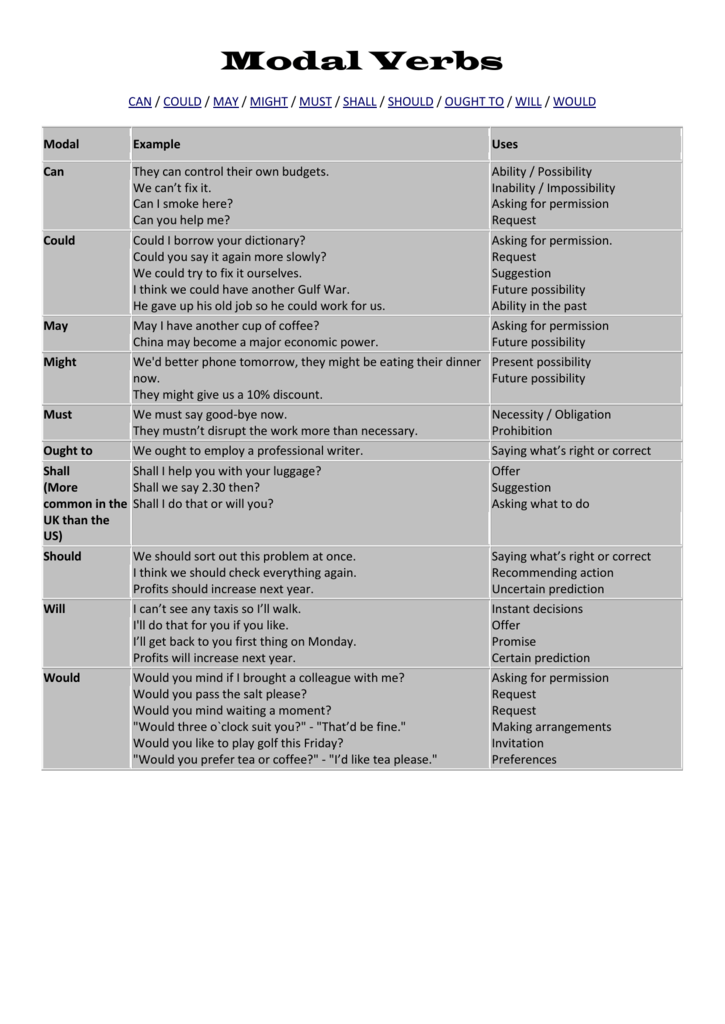Modal Verbs All You Need To Know About Can Could May Might Must Should Shall Will And Would

Modal Verbs All You Need To Know About Can Could May Might Must Should We’ll show you more than 40 real life examples to help you understand how to use these important words in everyday conversations. 🗣️ each modal verb is explained with different uses such as. English modal verbs : explanation on the use of can, could, may, might, should, ought to, shall, will, with an online exercise.

Modal Verbs Can Could May Might Must Shall Modals, also called modal verbs, are helping verbs that add meaning to the main verb. they can show things like ability, possibility, permission, necessity, or willingness. The principal english modals are can, could, may, might, must, shall, should, will and would. certain other verbs are sometimes, but not always, classed as modals; these include ought, had better, and (in certain uses) dare and need. Discover the power of modal verbs: can, could, may, might, must, should. learn how to use these essential english language tools for expressing possibility and obligation. Modal verbs, like can, may, will, and should, are special words that help us express abilities, permissions, and possibilities in english. they are always used with a base verb, like “can swim” or “may go.” these verbs are important because they help us make requests, give advice, and talk about what might happen.

Modal Verbs Must Can T May Might Could Worksheet Probability Discover the power of modal verbs: can, could, may, might, must, should. learn how to use these essential english language tools for expressing possibility and obligation. Modal verbs, like can, may, will, and should, are special words that help us express abilities, permissions, and possibilities in english. they are always used with a base verb, like “can swim” or “may go.” these verbs are important because they help us make requests, give advice, and talk about what might happen. Modal verbs are a subgroup of auxiliary verbs. they express modality and thus denote desires, abilities, obligations, or possibilities. due to their subjective meaning, they are an essential part of the english language and are used very frequently. Modal verbs are: can, could, may, might, must, shall, should, will, would. they are always followed by the base form of the verb (no ‘to’, no ‘ s’, no ‘ ed’). – she can speak french. – you must finish this. – i will call you later. they do not use do does did in questions or negatives. – should i go? do should i go? – he can’t swim. Modal verbs are like the swiss army knives of english grammar—they pack a lot of functions into small words! these handy little verbs— can, could, may, might, shall, should, will, would, and must —help you express possibilities, permissions, abilities, and even give advice. Using the right modal verb is important for clear communication. in this lesson, we’ll cover everything you need to know about modal verbs—what they are, how to use them, and examples for each one.

Modals Introduction Modal Verbs Can Could May Might Must Ought Modal verbs are a subgroup of auxiliary verbs. they express modality and thus denote desires, abilities, obligations, or possibilities. due to their subjective meaning, they are an essential part of the english language and are used very frequently. Modal verbs are: can, could, may, might, must, shall, should, will, would. they are always followed by the base form of the verb (no ‘to’, no ‘ s’, no ‘ ed’). – she can speak french. – you must finish this. – i will call you later. they do not use do does did in questions or negatives. – should i go? do should i go? – he can’t swim. Modal verbs are like the swiss army knives of english grammar—they pack a lot of functions into small words! these handy little verbs— can, could, may, might, shall, should, will, would, and must —help you express possibilities, permissions, abilities, and even give advice. Using the right modal verb is important for clear communication. in this lesson, we’ll cover everything you need to know about modal verbs—what they are, how to use them, and examples for each one.
Comments are closed.